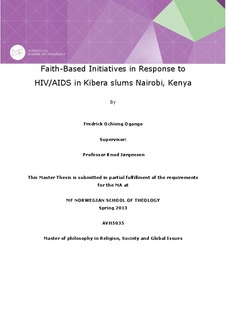Faith-based initiatives in response to HIV/AIDS in Kibera slums Nairobi, Kenya
Master thesis
Permanent lenke
http://hdl.handle.net/11250/161421Utgivelsesdato
2013-11-21Metadata
Vis full innførselSamlinger
Sammendrag
HIV/AIDS represents one of the greatest health challenges confronting the world. The
epidemic has evolved to become one of the greatest hindrances to national health of most
countries in the developing world. HIV/AIDS has slowed down economic growth, reduced
life expectancy and negatively affected development. Responding to these challenges,
different organisations have mounted exceptional responses that have drawn on the
commitment and wisdom of people from all walks of life.
Worldwide there is evidence of FBOs contributions to health sector. They include providing
care and support, building infrastructure, capacity building through training programs and
mobilizing large numbers of volunteers to causes they consider worthy. However, FBOs have
been accused of being “paper umbrellas” in the rain, exposing the people they are supposed
to protect to the HIV/AIDS epidemic. This study seeks to find out how FBOs have responded
to HIV/AIDS pandemic in the Kibera slum, Kenya.
I chose to carry out a qualitative study that sought to gather information on the current faith-
based HIV/AIDS initiatives in Kibera slum. Through data that were gathered by qualitative
interviews from FBO members and people living with HIV/AIDS (PLWHA) the research
intent was to understand the deeper structure of the epidemic within cultural and contextual
situations.
A strong emphasis has been on premarital abstinence and marital fidelity vis-a-vis condom
use. This is attributed to the fact that the organisations’ religious principles and the values
that guide them are not conducive of condom use. Some organisations have incorporated
other interventions due to the ever changing nature of the virus. Some leaders emphasized the
need for providing all the necessary information about condom use for the beneficiaries to
make informed choices.
Conclusions were then drawn that FBOs in Kibera are using a multi-sectorial approach to the
HIV/AIDS epidemic prevention, care and support interventions. In their comprehensive
approach, the FBOs have not only geared their efforts towards behavioural change strategies,
but also tackled issues like poverty that predispose people to the epidemic.
Various recommendations have been made, among them the need for FBOs to document their
work, the need to expand their network with other secular organisations and the need to viii
expand their initiatives towards other vulnerable populations like commercial sex workers
and men who sex with men.
